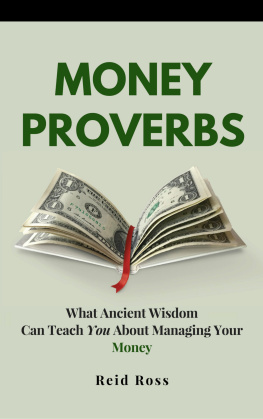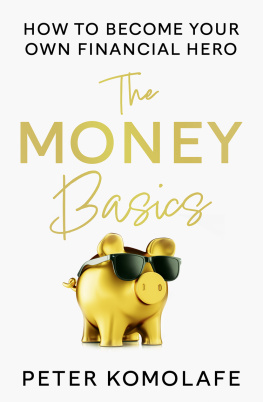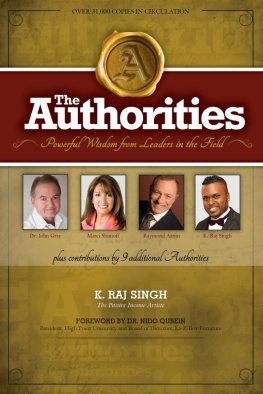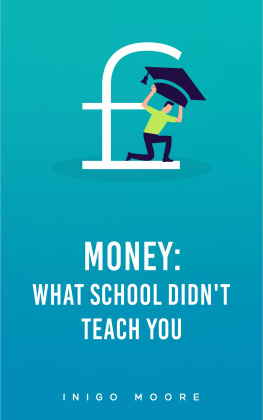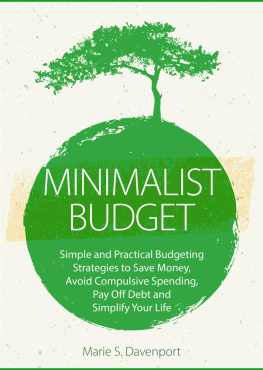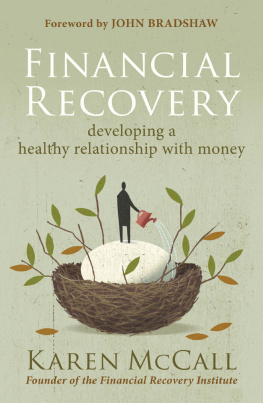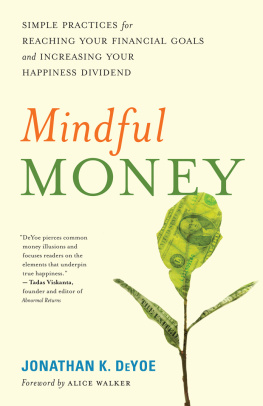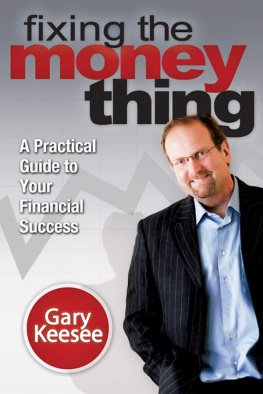MONEY PROVERBS
What Ancient Wisdom Can Teach You About Managing Money
Reid Ross
Copyright 2017 by Reid Ross. All Rights Reserved.
This publication is designed to provide educational and accurate information on personal finance. It is sold with the understanding that the author and publisher are not engaged in rendering professional services. If individual professional advice or other expert assistance is needed, please consult a financial advisor or professional expert.
All Scripture quotations, unless otherwise indicated, are taken from the Holy Bible, English Standard Version, ESV. Copyright 2001 by Crossway, a publishing ministry of Good News Publishers. Used by permission. All rights reserved.
All Scripture quotations, unless otherwise indicated, are taken from the Holy Bible, New International Version, NIV. Copyright 1973, 1978, 1984, 2011 by Biblica, Inc. Used by permission of Zondervan. All rights reserved worldwide. www.zondervan.com The NIV and New International Version are trademarks registered in the United States Patent and Trademark Office by Biblica, Inc.
Cover design done by Emily Dolson http://www.emilydolson.com
ISBN: 9781549857522
Imprint: Independently published
For additional resources from Reid Ross, visit him at his website WealthRehab.com.
Table of Contents
Introduction
Do you remember the time when you didn't stress about money?
For some, it was high school and for others, it was way back in elementary school. Or maybe you always were stressed about money. Regardless of your financial background, anxieties over money issues have touched each one of us at some point in our lives.
As I talk to people in my community, I notice that financial stress handicaps many. As I read the news, I see that this problem expands way beyond my community. Wage growth has slowed. The middle class is shrinking. The racial wealth gap is expanding. Loads of student debts are stifling any ounce of creativity that we might have had in college. Credit card debt is ballooning, and people are struggling to pay off their mortgages. All of us are still feeling the emotional pains from the 2008-09 financial collapse in some way.
I, along with many of my peers, know these pains intimately. I graduated college in 2009, fresh off the heels of the collapse. Even though I managed to secure a job in a limited job market at the time, many of my classmates werent so lucky. Some had to move back home with their parents in order to survive being underemployed for a season. As time progresses, many of my friends have accepted the fact that they will be renters the rest of their lives because they cant afford a home. We wrestle with whether to buy a home or start a family. For my generation, the American dream has morphed into an American nightmare.
Despite these challenges, there is hope.
I empathize with the quote from Marie Curie, the first woman to win the Nobel Prize: Nothing in life is to be feared, it is only to be understood. Now is the time to understand more, so that we may fear less.
We are at a unique time in history where globalization and technology are expanding at once. As we think through our money problems today, it is helpful to look back at timeless truths on money that have been in place for millennia. In researching for this book, I found that wisdom is never outdated and the problems we wrestle with today resemble those of old.
A proverb, in essence, is a short statement or wise saying that speaks to truths and patterns of human behavior. They express perspectives on common human experiences. Money Proverbs is a book about applying ancient proverbs to todays money problems. I specifically reference the Book of Proverbs, one of many books that make up the Bible. I have found that the Bible, as a whole, and the Book of Proverbs in particular, are bursting with nuggets of wisdom that can be applied to all aspects of life, even something as every day as money.
Money Proverbs aims to harness and explore practical insights on money from biblical proverbs. I present to you 12 principles that will help you move forward in your finances, specifically in the area of earning, saving, and giving. Along the way, you will meet individuals who handled money well and others who did not. You will hear of companies who failed at money management and learn how to avoid those mistakes in your own finances. And finally, you will learn finance terms and strategies to feel more confident with money. Thomas Friedman, an award-winning author and journalist, had two end goals for every column he wrote:
1. Turn on the light bulb in your head to illuminate an issue in a way that will inspire you to look at it anew.
2. To stoke an emotion in your heart that prompts you to feel or act more intensely or differently about an issue.
I have the same goals for this book. I hope to turn on light bulbs in your mind so that you are challenged and inspired to improve your finances for the better.
Principle One
Redefine Your
Vision of Wealth
One pretends to be rich, yet has nothing; another pretends to be poor, yet has great wealth
- Proverbs 13:7
Money is a key component of the human activity that moves our world. While it is important, money is neither bad nor good; its neutral. It takes on the form of the owner. If you are a stingy person, get more money and you will become even stingier. The opposite is true as well: if you are a generous person, the more money you receive, the more generous you become. As important as it is in society, money is not an end in itself; rather, it is a means to an end. In other words, you dont get money, just to get money. There has to be a purpose anchoring your finances. In Money Proverbs, I hope to challenge you to focus less on getting money and more about building wealth purposefully.
What is Wealth?
What is wealth anyway? Think about the first image that popped in your head. Was it a pile of $100 bills stacked up to the ceiling? Was it a luxury vehicle? Or, how about a 10-bedroom mansion sitting on multiple acres of land? I am not sure where you call home, but in America, these things have falsely become associated with wealth. Yes, some wealthy people own these things, but broke people own these things as well, as I will discuss later in the book. To find the correct definition of wealth, let's look at how Websters dictionary defines the word. Websters says this: wealth is an abundance of resources that one accumulates over time.
Resources
Resources. The word "resources" does not only apply to money. It could also mean items of value like cars, electronics, jewelry, homes, etc. These things are called assets, things of value that can be sold. Things that are not assets, for example, are academic degrees or work experience. You cant sell these things on eBay.
Accumulation
Wealthy people accumulate resources over time. For these people, the amount of resources tends to increase while their debt or expenses stay stagnant. Accumulation of resources occurs when ones income outpaces spending on a consistent basis. Note that this has nothing to do with the level of income. You can have a high level of income and still be broke. Or you can have a low level of income and be a millionaire. How is this possible? It is called living below ones means.
Abundance
Abundance means that you have more than enough resources to take care of immediate needs. As a result, wealthy people dont live paycheck to paycheck because they have enough cash saved up in the case of an emergency. They operate consistently in surplus.
As I think through these things, I realize that most of us are not even close to being considered wealthy. N otice that I did not include any numbers so far. The reason? Because wealth is a moving target. Consider this: the western world makes up the 1% in terms of household income from a global perspective. Also, consider if you have an annual salary of $34K with no increases, you could make $1.3M over a 40-year career. My point is this: we currently live in a society where our actual wealth is high, and our relative wealth is low. Wealth is relative.
Next page
